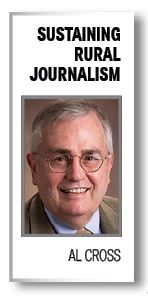Finding new owners has transformed over the years
Chip Hutcheson
Feb 1, 2023


This month’s Pub Aux features articles on buying and selling newspapers. In recent years, other options have come into play — especially in rural communities.
Family owned papers might find that selling is not a viable option, especially in small communities not appealing to chain ownership. Columnist Al Cross mentioned last month a trend for rural papers to move to a nonprofit status. Judging from the comments heard in recent years, there are a number of owners who jokingly would say that describes their situation, especially since COVID-19 entered the picture. That’s not what Al was referencing. News outlets are emerging that are 501(c)(3) entities, which typically are devoted to local government and business development. Grants and donors help foot the operational costs.
Another option is to stop printing a paper and take it online. That’s what is happening with an award-winning weekly in Kentucky. The Todd County Standard was named the best of its class for nine straight years in Kentucky Press Association contests, winning more than 200 awards in writing, photography and design. Its owner, Ryan Craig, is also the student media advisor to the Kentucky Kernel, the student newspaper of the University of Kentucky.
Craig said the decision to halt the printed product was a combination of dealing with higher postage and printing costs. He wrote in 2019 about the future of weekly newspapers: “Until recently, I was sure that weeklies, especially good ones, would survive the downturn of newspapers or would hold out a lot longer before the eventual transition to digital.
“I was so sure of the fortitude of weeklies that I would encourage the students I advise at the University of Kentucky not to underestimate a career in local newspapers. One could do worse than being a crusading small-town editor. Now, I tell my students to be diverse in their skill sets — good reporting and multimedia skills are welcome everywhere — and warn them to seek jobs at places, regardless of size, where they can practice good journalism in as stable a newsroom as possible.
“I have started to believe that weeklies aren’t as safe as destinations as they once were, that there will sooner rather than later be a vacuum of local news in rural places across the country.”
Craig bought that newspaper in 2005, and his bulldog reporting soon ruffled feathers of some public officials. The local sheriff made a practice of going through the courthouse, cocking his shotgun and saying, “Nobody is arresting me because of the Todd County Standard.”
In 2011, Craig’s investigation into the murder of a girl in foster care led to an uncovering of serious flaws in the Kentucky social-services system. State officials tried to cover up that case, but Craig went to court to have the girl’s files made public. That investigation, coupled with stories in the state’s two largest dailies, helped lead to the resignation of the cabinet secretary, the retirement of the social services commissioner and legislative hearings on a governor-appointed panel to examine child abuse deaths and near-deaths.
Only time will tell if moving the paper online will keep it alive. That’s especially true in a small, rural county setting where good internet service might be lacking.
As of 2021, census figures show 65 percent of the county households have a broadband internet connection. What will be the response of residents and advertisers to an online product versus a printed version?
There’s another option, and it’s not a pleasant one. Shutter the doors and cease publication. That often occurs when a family run paper — often a husband and wife — are ready to retire and none of their children or grandchildren have any desire to follow in those footsteps.
In recent months, four newspapers in Kentucky have stopped publishing.
Just before the end of 2021, the Citizen Voice & Times and the Clay City Times were closed by retiring publisher/owner Teresa Hatfield. On Dec. 30, the Princeton Banner, which was in business two years, halted publication — but dangled a carrot to readers that it might reappear online at a later date.
In early 2023, The Sentinel in Radcliff, Kentucky, said it was closing. That paper, located just outside Fort Knox, traces its roots back to 1948.
These closures are sad in so many respects. Those communities will suffer because of the loss of coverage of local government, schools, businesses and local sports. There’s a personal element in this situation — newspapers in every state have unique individuals whose escapades and reputation are part of newspaper lore. We often call those people “characters” because their stories create lasting legacies.
Take the case of The Sentinel. Its founder, James Royalty, died at age 91 in February 2021. With two of the five family members deceased, the remaining family decided to cease operations.
Royalty was not only a newspaper owner, but a Baptist pastor. He pastored the same church for 71 years! That’s only a year shy of a Guinness World Record. He used his newspaper and his pulpit to share his faith.
Perhaps one of the most legendary newspaper owners/publishers in Kentucky was Larry Craig, a Kentucky Baptist pastor and an uncle to Ryan Craig. Larry died in 2011 but leaves behind some wonderful stories.
FOR INSTANCE ...
• At the Green River Republican he owned, it became known that he had obtained a list of alleged voters who were willing to sell their votes. That led to someone shooting through a front window of the newspaper office. Craig started carrying a gun, earning him the title of “pistol-packing preacher-publisher.”
• When he was a journalism professor, he told Western Kentucky University’s student newspaper that the Ku Klux Klan was a “putrid cancer.” A Klan member or sympathizer burned the church he was pastoring.
• In 2009, one man told Craig that “he couldn’t see how I could raise hell all week and then preach against hell on Sunday” but said both professions prize truth, justice and accountability.”
In a Kentucky Press meeting with state legislators, Craig was asked to voice an opening prayer. He prayed, “Father, please forgive them, for they know not what they do.” At a state press convention banquet, his invocation included: “Bless this food, Lord; you know it sure needs it.”
• Craig’s watchdog work wasn’t limited to public officials; he published names he found on trash at illegal dumps. He said that resulted in the most negative reaction he ever received.
• He wrote in a 1987 column that some editors “find themselves in the role of an attack dog; others don’t go far enough in exposing wrongdoing, primarily because they don’t want to rock the boat or get anybody upset. That’s lap-dog journalism. I prefer the middle road, one based on common sense and hard-nosed journalism tempered with compassion. A good guard dog is one that is a friend to all while being a protector.”
Finding that good guard dog these days is a challenge — one enhanced by long hours and possibly little financial reward. But a good guard dog serves a worthy purpose, and our communities are just not the same when that dog disappears.
Chip Hutcheson is the retired publisher of The Times Leader in Princeton, Kentucky. He was NNA president in 2015. He currently serves as a content strategist for Kentucky Today, the online news website of the Kentucky Baptist Convention. chiphutcheson@yahoo.com










